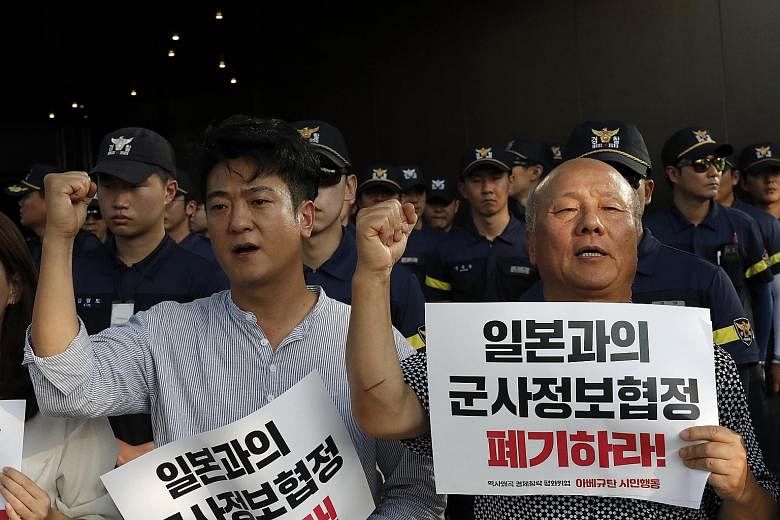SEOUL • South Korea yesterday said it will end an intelligence-sharing pact with Japan, a decision that could further escalate a row over history and trade, and undercut security cooperation on North Korea.
With the decision not to extend the pact, the political and trade disputes between South Korea and Japan now extend into some of the most sensitive national security issues in the region.
The arrangement was designed to share sensitive information on the threat posed by North Korea's missile and nuclear activities, and the move to end it comes after Pyongyang launched a series of short-range ballistic missiles in protest against what it sees as military build-ups in South Korea and Japan.
The General Security of Military Information Agreement (GSOMIA) was due to be automatically renewed tomorrow. South Korea's decision to end it was announced after a discussion within the presidential National Security Council (NSC) and was approved by President Moon Jae-in.
Japan created a "grave change" in the environment for bilateral security cooperation by removing South Korea's fast-track export status, said Mr Kim You-geun, a deputy director of the NSC. He said Japan cited security concerns without providing specific evidence for its decision on South Korea's trade status.
"Under this situation, we have determined that it would not serve our national interest to maintain an agreement we signed with the aim of exchanging military information which is sensitive to security," Mr Kim told a news conference.
Tokyo yesterday summoned the South Korean ambassador to Japan Nam Gwan Pyo to protest against Seoul's decision, Japanese Foreign Minister Taro Kono said.
Mr Kono lambasted the decision, called the move "extremely regrettable", and said that it "completely misreads the security situation in North-east Asia".
Japanese Chief Cabinet Secretary Yoshihide Suga had told a news conference before the announcement that Japan believed it should cooperate with South Korea "where cooperation is necessary" despite the recent strain in ties.
Foreign ministers of the two countries met this week outside Beijing but failed to reach any substantive agreements.
The South Korean decision is likely to be met with dismay in the United States.
South Korea's Foreign Minister Kang Kyung-wha emphasised that the decision to end the intelligence pact was the result of a lack of trust in Japan, saying: "We will continue to strengthen cooperation with the US and develop the alliance."
Pentagon spokesman Dave Eastburn urged both sides to work together, saying intelligence-sharing is key to developing a common defence policy and strategy, and that all three countries are safer when they cooperate.
The US played a key role in initiating the hard-won GSOMIA, which was clinched in 2016 after a 2012 plan fell apart in the face of opposition in South Korea towards military cooperation with old foe Japan.
Relations between the two US allies are at their lowest since they normalised ties in 1965, plagued by bitterness over Japan's 1910-1945 occupation of South Korea, which included the use of South Korean forced labour at some Japanese firms.
REUTERS, KYODO

